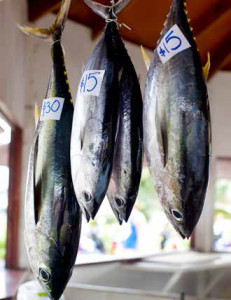The Marine Fishing Sector
 Fisheries make a major contribution to the economies of many developing countries through foreign exchange earnings and employment creation.
Fisheries make a major contribution to the economies of many developing countries through foreign exchange earnings and employment creation.
In the Pacific region, for example, the Western and Central Pacific – Commission Area (WCP-CA) reported purse seine fishing produced 1.9 million tonnes of tuna, valued at over US$3.2 billion. Of this, 79 per cent was from the Exclusive Economic Zones (EEZs) of Pacific Islands Forum Fisheries Agency (FFA) member countries. Longline vessels caught an estimated 269,000 tonnes, worth more than US$1.7 billion in WCP-CA in 2014.
This total catch volume will require to be refrigerated, from the catch to the food plate. There is need for a detailed study on the type of refrigeration systems and maintenance practices including the supply chain.
Transport Refrigeration
The technical requirements of transport refrigeration systems are extremely complex.
Refrigeration and air-conditioning (RAC) equipment has to operate over a wide range of ambient temperatures and weather conditions (wind, solar radiation, rain, sea water spray, etc.).
Refrigerant charges vary between less than 1 kg
(refrigerated vans) and more than several kg (trucks, trailers and reefer containers) to 3,000 kg on board large fishing vessels (Schwarz et al., 2011).
Leakage rates are estimated at 20 per cent for trucks/trailers, 30 per cent for vans and up to 40 per cent for fishing vessels (Schwarz et al., 2011; UNEP TEAP 2014).
Policy, Legislation and Technology Requirements
To support the management of the phase-out of ODS in the marine fishing sector, multi-sectoral and cross-boundary approaches could be considered. Drawing from the HCFC phase-out management for land-based systems recommended policy, legislative and technology support can be as follows:
• Strengthen enforcement controls in ODS supply chain management and with the engagement of Customs, Port, Trade and Fisheries regulating bodies.
• Encourage border dialogues on ODS supplies and for the prevention and control of illegal trade.
• Inclusion of the Montreal Protocol on ODS and refrigeration management into fisheries management practices nationally, regionally and internationally.
• Foster synergies with other international agreements, for example, Flag State responsibilities and MARPOL rules.
• RAC training in good practices servicing and specialised for marine refrigerated systems
• Financial and technical support for adaptation to best available alternatives.
• Develop a marine RAC Road Map for research and development of the implementation of Decision XIX/VI of the Montreal Protocol.

